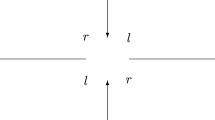Abstract
I want to extend here a line of reasoning that I pursued in Rationality and Dynamic Choice (1990). In that book I argued that the standard Bayesian model of expected-utility reasoning needs to be revised to accommodate a capacity, on the part of rational decision-makers, to effectively coordinate with their own future selves — to be guided by plans that they have deliberately adopted. I also suggested that an analogous line of reasoning might be employed to show that rational agents could engage in rule-governed coordination of their choices with one another to a greater extent than the standard theory would seem to admit. It is this suggestion that I now want to explore more fully in the present paper. It is not that the standard theory denies the possibility of such coordination. On that account, however, coordination can only be achieved by the adoption of an effective enforcement system. Since, however, any enforcement scheme requires the expenditure of scarce resources, the standard theory seems committed to the view that rational agents can achieve only a second best outcome. It is worth considering whether thoroughly rational persons who know each other to be such might not do better than this. It is also the case that the process whereby individuals come to agreement on the terms of their coordination schemes is conceived as driven essentially by non-cooperative considerations, specifically the relative bargaining power or threat advantage of the participants. Bargaining outcomes based on this principle, however, tend to generate mutually disadvantageous conflict, and thus there are greater costs yet to be borne by “rational” interacting agents. I shall have to leave the exploration of this second problem to another occasion, however.
Access this chapter
Tax calculation will be finalised at checkout
Purchases are for personal use only
Preview
Unable to display preview. Download preview PDF.
Similar content being viewed by others
References
A.A. Alchian, “Uncertainty, Evolution and Economic Theory”. in: Journal of Political Economy, 58, 1950, pp. 211–21.
W.B. Arthur, Increasing Returns and Path Dependence in the Economy. Ann Arbour: The University of Michigan Press 1994.
R. Axelrod, The Evolution of Cooperation. New York: Basic Books 1984.
R. Axelrod/D. Dion, “The further evolution of cooperation”, in: Science, 242, 1988, pp. 1385–90.
M.E. Bratman, Intention, Plans, and Practical Reason. Cambridge, Mass.: Harvard University Press 1987.
J.M. Buchanan/R.D. Tollison/G. Tullock, Toward a Theory of the Rent-Seeking Society. College Station: Texas A & M University Press 1981.
J.M. Buchanan/G. Tullock, The Calculus of Consent. Ann Arbor: University of Michigan Press 1962.
R.H. Coase, “The nature of the firm”, in: Economica,4, 1937, pp.386–405.
R.H. Coase, “The problem of social cost”, in: Journal of Law and Economics,3, 1960, pp.1–44.
D. Fudenberg/J. Tirole, Game Theory. Cambridge, Mass.: The MIT Press 1992.
F.A. Hayek, “Notes on the evolution of systems of rules of conduct”, In: Studies in Philosophy, Politics, and Economics. Chicago: University of Chicago Press 1967.
D. Lewis, Convention. Cambridge, Mass: Harvard University Press 1969.
J. Knight, Institutions and Social Conflict. Cambridge: Cambridge University Press 1992.
R.D. Luce/H. Raiffa, Games and Decisions. New York: Wiley & Sons 1957.
E.F. McClennen, Rationality and Dynamic Choice: Foundational Explorations. Cambridge: Cambridge University Press 1990.
E.F. McClennen, “The theory of rationality for ideal games”, in: Philosophical Studies,65, 1992, pp.193–215.
E.F. McClennen, “Rationality and Rules”, in: Peter Danielson (ed.), Modeling Rational and Moral Agents. Oxford: Oxford University Press 1997, pp. 11–39.
D.C. North, Institutions, Institutional Change and Economic Performance. Cambridge: Cambridge University Press 1990.
R.A. Posner, Economic Analysis of Law. Boston, Mass: Little, Brown 1986.
J. Rawls, “Two concepts of rules”, in: The Philosophical Review,64, 1955, pp.3–32.
T.C. Schelling, The Strategy of Conflict. Cambridge, Mass.: Harvard University Press, 1960.
R. Sugden, “Spontaneous order”, in: Journal of Economic Perspectives,3, 1989, pp.85–97.
E. Ullman-Margalit, The Emergence of Norms. Oxford: Oxford University Press 1978.
J. von Neumann/O. Morgenstern, Theory of Games and Economic Behavior (Third Edition) Princeton: Princeton University Press 1953.
Author information
Authors and Affiliations
Editor information
Editors and Affiliations
Rights and permissions
Copyright information
© 1998 Springer Science+Business Media Dordrecht
About this chapter
Cite this chapter
McClennen, E.F. (1998). Rethinking Rational Cooperation. In: Leinfellner, W., Köhler, E. (eds) Game Theory, Experience, Rationality. Vienna Circle Institute Yearbook [1997], vol 5. Springer, Dordrecht. https://doi.org/10.1007/978-94-017-1654-3_10
Download citation
DOI: https://doi.org/10.1007/978-94-017-1654-3_10
Publisher Name: Springer, Dordrecht
Print ISBN: 978-90-481-4992-6
Online ISBN: 978-94-017-1654-3
eBook Packages: Springer Book Archive




